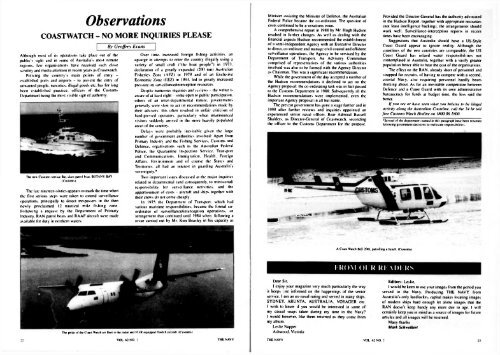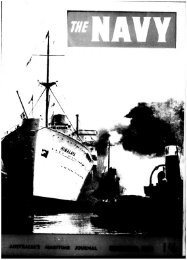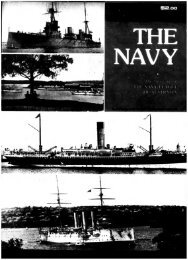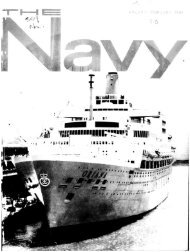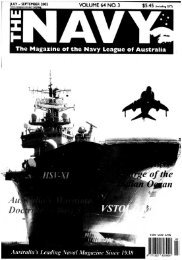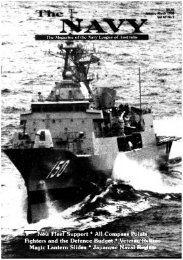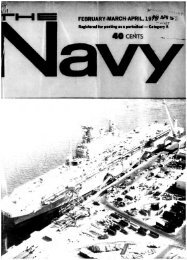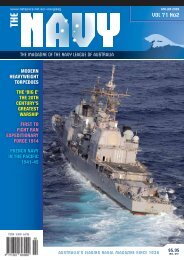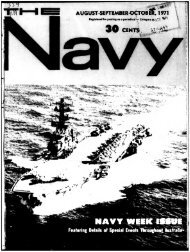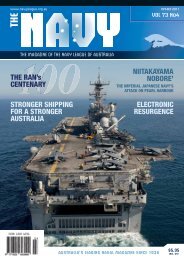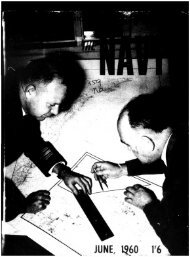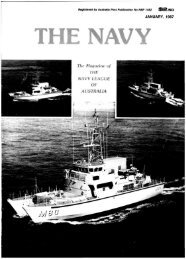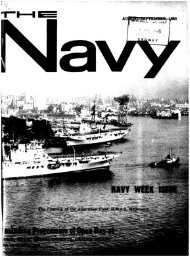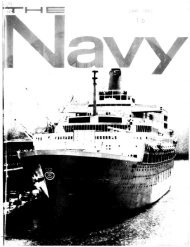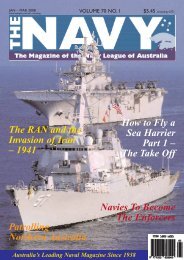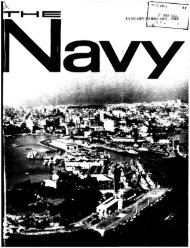Indian Naval Expansion Maritime - Navy League of Australia
Indian Naval Expansion Maritime - Navy League of Australia
Indian Naval Expansion Maritime - Navy League of Australia
You also want an ePaper? Increase the reach of your titles
YUMPU automatically turns print PDFs into web optimized ePapers that Google loves.
Observations<br />
COASTWATCH - NO MORE INQUIRIES PLEASE<br />
Although most <strong>of</strong> its operations take place out <strong>of</strong> the<br />
public's sight and in some <strong>of</strong> <strong>Australia</strong>'s most remote<br />
regions, few organisations have received such close<br />
scrutiny and media attention in recent years as Coastwatch.<br />
Policing the country's main points <strong>of</strong> entry -<br />
established ports and airports - to prevent the entry <strong>of</strong><br />
unwanted people, narcotics, illegal goods etc. has for long<br />
been established practice, <strong>of</strong>ficers <strong>of</strong> the Customs<br />
Department being the most visible sign <strong>of</strong> authority.<br />
The new Customs service Bay class patrol boat. BOTANY BAY<br />
(Customs).<br />
The late nineteen-sixties appears to mark the time when<br />
the first serious steps were taken to extend surveillance<br />
operations, principally to detect trespassers in the then<br />
newly proclaimed 12 nautical mile fishing zone.<br />
Following a request by the Department <strong>of</strong> Primary<br />
Industry. RAN patrol boats and RAAF aircraft were made<br />
available for duty in northern waters.<br />
By Ge<strong>of</strong>frey Evans<br />
Over time, increased foreign fishing activities, an<br />
upsurge in attempts to enter the country illegally using a<br />
variety <strong>of</strong> small craft ("the boat people") in 1973.<br />
declaration <strong>of</strong> a greatly expanded (2(X) nm) <strong>Australia</strong>n<br />
Fisheries Zone (AFZ) in 1979 and <strong>of</strong> an Exclusive<br />
Economic Zone (EEZ) in 1994. led to greatly increased<br />
pressure on Nurveillance/interception resources.<br />
Despite numerous inquiries and reviews - the writer is<br />
aware <strong>of</strong> at least eight - some open to public participation,<br />
others <strong>of</strong> an inter-departmental nature, governments<br />
generally were slow to act on recommendations made by<br />
their advisers; this <strong>of</strong>ten resulted in unfair criticism <strong>of</strong><br />
hard-pressed operators, particularly when unannounced<br />
visitors suddenly arrived in the more heavily populated<br />
areas <strong>of</strong> the country.<br />
Delays were probably inevitable given the large<br />
number <strong>of</strong> government authorities involved: Apart from<br />
Primary Industry and the Fishing Services. Customs and<br />
Defence, organisations such as the <strong>Australia</strong>n Federal<br />
Police, ihe Quarantine Inspection Service. Transport<br />
and Communications. Immigration. Health. Foreign<br />
Affairs. Environment and <strong>of</strong> course the States and<br />
Territories, all had an interest in guarding <strong>Australia</strong>'s<br />
sovereignty.*<br />
Two important issues discussed at the major inquiries<br />
related to departmental (and consequently, to ministerial)<br />
responsibility for surveillance activities, and the<br />
apportionment <strong>of</strong> costs - aircraft and ships together with<br />
their crews do not come cheaply.<br />
In 1975 the Department <strong>of</strong> Transport, which had<br />
various maritime responsibilities, became the formal coordinator<br />
<strong>of</strong> surveillance/interception operations, an<br />
arrangement that continued until 1984 when, following a<br />
revue carried out by Mr Kim Beasley in his capacity as<br />
Minister assisting the Minister <strong>of</strong> Defence, the <strong>Australia</strong>n<br />
Federal Police became the co-ordinator. The question <strong>of</strong><br />
costs continued to be a vexations issue.<br />
A comprehensive report in 1988 by Mr. Hugh Hudson<br />
resulted in further changes. As well as dealing with the<br />
financial aspects Hudson recommended the establishment<br />
<strong>of</strong> a semi-independent Agency with an Executive Director<br />
to direct, co-ordinate and manage civil coastal and <strong>of</strong>fshore<br />
surveillance operations, the Agency to be serviced by the<br />
Department <strong>of</strong> Transport. An Advisory Committee<br />
comprised <strong>of</strong> representatives <strong>of</strong> the various authorities<br />
involved was also to be formed with the Agency Director<br />
as Chairman. This was a significant recommendation.<br />
While the government <strong>of</strong> the day accepted a number <strong>of</strong><br />
the Hudson recommendations it declined to act on the<br />
Agency proposal: the co-ordinating task was in fact passed<br />
to the Customs Department in 1988: Subsequently all the<br />
Hudson recommendations were implemented, even the<br />
important Agency proposal in all but name.<br />
The present government has gone a stage further and in<br />
1999 after further reviews and inquiries appointed an<br />
experienced senior naval <strong>of</strong>ficer. Rear Admiral Russell<br />
Shalders. as Director-General <strong>of</strong> Coastwatch. seconding<br />
the <strong>of</strong>ficer to the Customs Department for the purpose.<br />
mm<br />
• r -Trrr M


